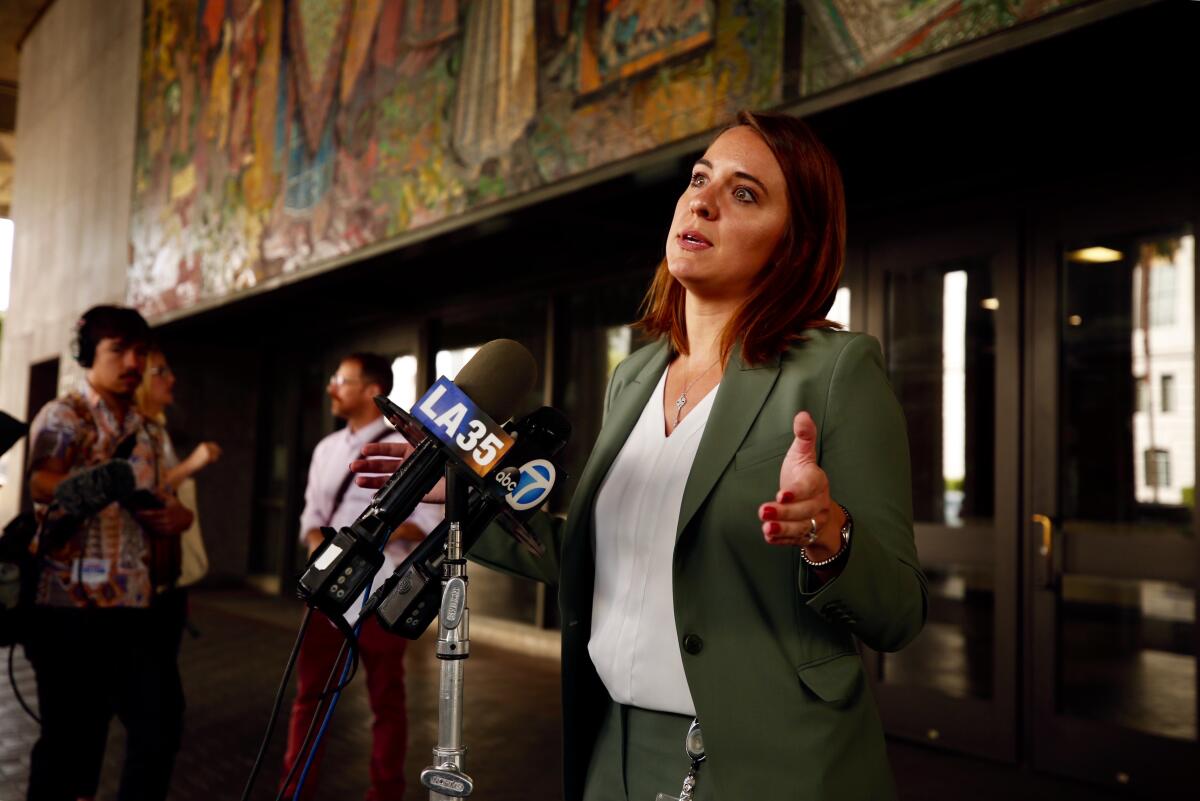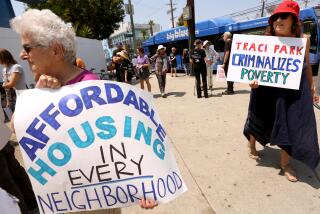L.A.’s homeless agency faces calls to dissolve ties with police

As protests roiled Los Angeles, the head of the Los Angeles Homeless Services Authority was spurred to speak out after seeing a gruesome image of a homeless man bleeding from his eye — an injury allegedly caused by a round fired by police.
“Police violence is unacceptable against all and especially against vulnerable people experiencing homelessness who have nowhere else to go,” Heidi Marston wrote on Twitter on June 6. “We are calling for immediate and lasting reforms.”
That same morning, a LAHSA supervisor was chastised for sending all her coworkers a petition with a much broader demand: To immediately end their partnerships with police agencies.
In an impassioned email to her coworkers, Kristy Lovich had argued that working with police defied their core values and undermined their work, especially since Black people make up a disproportionate share of people who are homeless.
The episode is the latest eruption of a longstanding debate within the agency, which handles homeless outreach and services across Los Angeles County, over how — or whether — to work with law enforcement. As protests over police brutality and racism sweep Los Angeles and the country, that debate has exploded into public view.
Lovich, who is white, wrote in her petition about talking to a Black woman suffering serious illness while living on the streets. The woman shared experiences of police harassment and abuse and asked Lovich, “I am still a viable person, right?”
“I would not have been able to make this kind of connection with police officers at my side,” Lovich wrote.
Some coworkers chimed in to support Lovich and her petition, which soon spread beyond the agency, garnering thousands of signatures. But her supervisor told her the email was inappropriate and had caused pain to many of LAHSA’s Black staff.
Others at the agency felt their experiences were “erased by your implication that meaningful connections and relationships cannot be achieved by our teams who work with law enforcement,” Victor Hinderliter wrote, asking to meet with Lovich.
Soon after, Lovich decided to take sick leave. In an interview, she said she feared her job was in jeopardy and felt her work environment had become hostile. LAHSA declined to comment on her claims, saying it was a personnel matter.
The petition comes amid a broader push to pare back the budgets and scope of police agencies, which critics argue are poorly equipped to handle a host of problems that could be better addressed by reinvesting in other services.
Marston said the agency does not fund or contract with law enforcement, but its employees do sometimes work alongside police or deputies. As long as people are living outside, Marston said, they are bound to interact with law enforcement.
“So to the extent that that is unavoidable,” Marston said, “we want our partnerships with those entities to be positive and to be able to reflect the values that LAHSA upholds in how we treat individuals who are unsheltered.”
Marston added that “we have consistently said we want to see law enforcement as a last resort.”
Under guidelines issued last year, the agency has cautioned cities that “standard law enforcement activities such as requests for identification can be perceived as threatening, harassing, or intimidating and therefore disruptive to successful service connections.”
Sarah Dusseault, chairperson of the LAHSA Commission, said she hoped to use this “very unique moment ... to prioritize access to services and break away from systems that criminalize homelessness,” but it is too soon to say what might change at the agency.
Dusseault added that although there have been concerns about working with law enforcement, LAHSA has also had positive interactions with “rock star folks” such as LAPD Officer Deon Joseph, who has patrolled skid row.
LAHSA employees, who declined to be identified because they are not authorized to speak to the media, expressed a wide range of views on police involvement. One said he was hurt by the petition; another enthusiastically endorsed it. A third said many of her coworkers saw the roles of LAHSA and police as inherently overlapping.
Some want police to play “a very distant role when homeless encampments are being cleaned up so that police presence doesn’t result in elevated tensions with the unhoused population,” SEIU 721 president Bob Schoonover, whose union represents LAHSA workers, said in a written statement, “while other LAHSA members have expressed the need to have police nearby to help them deal with those specific situations where weapons may pose a danger.”
Long before the wave of recent protests, LAHSA was drawn into a tug-of-war over how the city should clean up around homeless encampments, including the degree of involvement of law enforcement.
The CARE system was supposed to be more sensitive to the needs of homeless people, but within months of its rollout, the program was adjusted. After complaints about teams being slower to crack down on what people keep on the streets, CARE program supervisors were told that sanitation workers had the final say on what should be tossed.
In January, L.A. said police would go out automatically with cleanup teams wherever sanitation workers had safety concerns.
“It just reverted back to how it was,” said Jane Nguyen of the homeless outreach and advocacy group KTown for All.
The changes frustrated some LAHSA workers, who felt that being part of the cleanups — but not in control of them — had hurt their ability to do outreach. Homeless advocates who work with other groups echoed that sentiment: Jo Dominguez, who does outreach in northeast Los Angeles for a Department of Health Services contractor, said he has had to tell clients living on the street, “No, we’re not LAHSA.”
That reputation comes in part, Dominguez said, from when “you come in with the police. People fear they’re going to get arrested or get their items taken or put in jail.”
Lovich eventually informed her supervisor that she would not oversee cleanup teams, and the work was reshuffled to other supervisors.
By February, there was talk of walkouts over concerns with how CARE was being implemented. In an email obtained by The Times, one union steward encouraged LAHSA workers to call her about speaking out about the program, but cautioned that “there should be no walkouts your jobs are not protected unless you are doing it with the union.”
Some employees felt they had reason to worry: After outreach worker Ashley Bennett was terminated from her job earlier this year, she publicly asserted that she had been dismissed as the direct result of complaints from Councilman Mitch O’Farrell and other city officials about her advocating against clearing an encampment at Echo Park Lake.
LAHSA declined to comment; an O’Farrell spokesman said neither he nor his staff had complained about Bennett demonstrating at Echo Park Lake.
Marston said LAHSA had worked with the city to ensure police were not “immediately visible” during cleanups. In addition, she said outreach workers started meeting with homeless people ahead of cleanups, instead of during them.
An LAPD homeless coordinator did not respond to messages seeking comment on the petition. As of Friday, more than 6,000 people had signed the petition. Other Angelenos balked at the idea. Rick Swinger, a Venice resident who has raised concerns about pollution from encampments, complained that LAHSA “really doesn’t have the authority needed to clean the streets” without police to assist.
After Lovich sent out her petition, Marston replied and said she appreciated the passion, but wanted “to clarify the appropriate communication channels for these discussions.” Marston said in a later interview that she wants staff to feel they have a voice, but it needs to happen in a way that is “safe for everybody who’s involved.”
Lovich said that despite worries about speaking up, she decided to share the petition after hearing a LAHSA commissioner declare last week that it was time to take action.
“We’re in a critical moral moment,” Lovich said, “and I do not feel compelled to wait for this organization to come up with the so-called ‘appropriate’ way to do this.”
More to Read
Sign up for Essential California
The most important California stories and recommendations in your inbox every morning.
You may occasionally receive promotional content from the Los Angeles Times.








